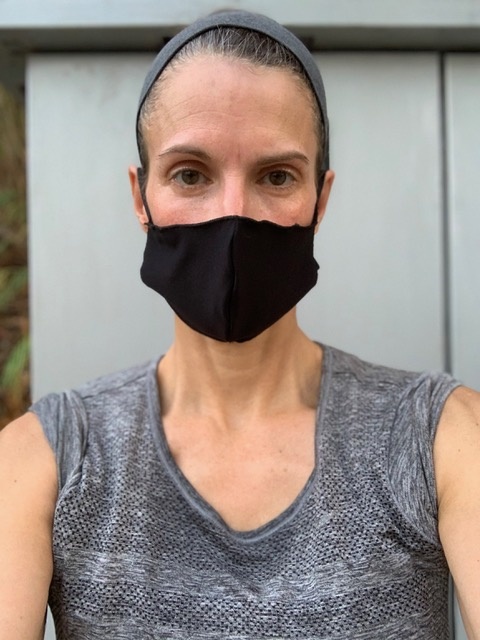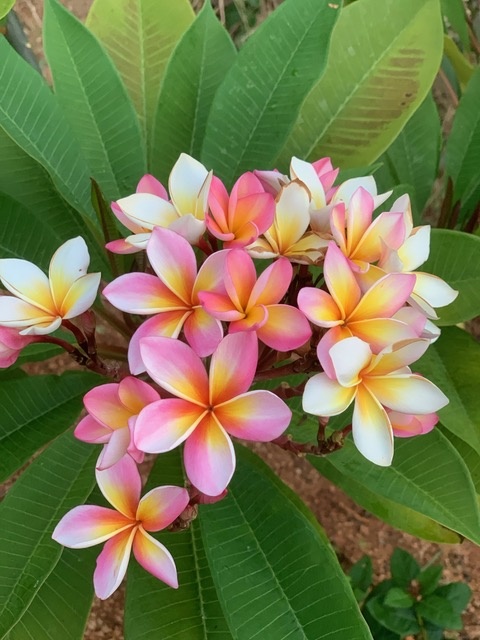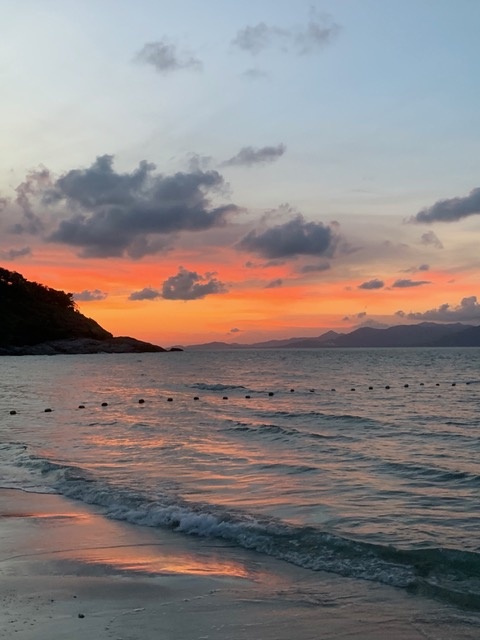SMALL EXPERIENCE By Tey Meadow and L.A. Paul

As the first quarantine descended on New York City, Tey found it impossible to write. It wasn’t merely that she was suddenly homeschooling her eight-year-old daughter. She shared that responsibility with two other adults and was on a writing leave from the university where she teaches. She had little stretches of time, a sunlit home office, and a pile of fieldnotes from a recent ethnographic project and an outline in which to fit them. But something about her relationship to representing the world in language felt stymied. When asked in late March 2020 by a sociological magazine to offer a reflection on ethnography in the time of Covid, she amused herself by imagining sending in a blank page as the definitive statement on the topic. As reports of death and fear in Italy streamed in and her world began to close, anchored by her child, Tey’s life suddenly narrowed to the width of her desk, and a struggle against an empty page.
Laurie, on the other hand, made a snap decision to escape. She lives alone but has a rich network of friends and, pre-Covid, spent a great deal of her free time traveling internationally to lecture. Blindsided by the implications of self-quarantine, the loss of connection implied by the imminent lockdown felt unbearable. She panicked. But she was privileged enough to have options. With less than an hour to spare, she found some leftover masks from a visit to Beijing, packed a bag, and booked a flight for Bangkok.
In Thailand, Laurie found a quiet bungalow and stocked up on supplies, muting the loss of social contact with a garden filled with tropical flowers and a stray dog who accompanied her runs up and down the mountain. She discovered the scent of lemongrass pandan tea and the taste of ripe durian. She spent afternoons on the beach, staring into the waves and wondering what would be left of her life when she returned. Each day, as the sun sank and the insects and bats awoke, she constructed a schedule connecting her to friends on the other side of the world, arranging Zoom drinks, meetings with students, and teaching seminars, usually ending around 3 a.m. In the middle of the night, she’d close her laptop and look at the moon, and try not to worry about all the friends and loved ones she’d left behind.
The change of place changed her perspective. Stepping out of her life in New Haven and replacing it with a distant new existence made it possible for Laurie to look back and examine her surroundings, and to realize sources of unappreciated value. The contrast between the grey world of New Haven in March, cold, yet filled with friends and activity, with the vibrant beauty of the Thai coastline, as contemplated in deep solitude, disrupted her typical modes of perception. It gave her a fresh ability to attend to details, to appreciate the new, but also to notice absences, and to apprehend the texture of those absences. The visit was long, and the opportunity for reflection substantial. She didn’t make it back to the US until three months later, and even then she found herself patching together flights through the few airports that were still open and fretting she’d be turned away by border control. Arriving home to an empty JFK and a shell-shocked city, she faced an isolated apartment and a profoundly altered life.

Heady telepresent conversations that began across oceans have landed us nearly a year later, here in this essay. Tey is an ethnographer who studies various features of intimate (gendered and sexual) life; [1] Laurie is a philosopher who writes about transformative experiences. [2] We are both fortunate: we work in the academy, which provided and continues to provide stable, remote employment and time for creative work. In short, we had the time, the resources, and the desire to think together. Our reflection allowed each of us to recognize something at work in our immediate surroundings, a response to the pandemic that radically altered our individual subjectivities and gave us a more intricate attunement to everyday things: the kind of attunement that comes when one’s whole relation to the world is in rupture; the kind of experience where one more radically inhabits one’s existing subjectivity. Each of us began to see herself in relation to the objects in our immediate surroundings in new, more complex ways.
Tey noticed that a neighbor on her outer Brooklyn street set a large sandwich board outside his door, and each day, he would chalk a poem on it. Claudia Rankine and James Baldwin. Seamus Heaney and William Blake. Morning walks with her dog, Teddy, became an ever-slower affair. Three houses down, across Albemarle Road, one house over to the sandwich board. The first thing she noticed was that there was an errant electric cord, blue, taped alongside one of the traffic lights in front of her neighbor’s house. The tape peeled away slowly over many weeks. The bark on the dogwood tree in a neighbor’s house a few feet away was also peeling away. When April came and the first bulbs along the median of Albemarle Road began to bloom, she began thinking of the way the daffodil bulbs she’d planted last fall had also peeled. She found herself acutely tuned into the texture of the universe that separated her from the sandwich board not 200 meters away. Peeling tape, tree bark, bulbs. How she might sit on the grass with her daughter come summer and peel apart blades of grass. She began thinking about touching things she sees but doesn’t usually notice. She started connecting those thoughts to the lack of touch in pandemic times, to her relationship to touch, to the people she wished she could touch, even to the types of touch she felt relieved to avoid. While Tey was more in touch with parts of her aloneness, she felt paradoxically a new kind of peace with aloneness, an aliveness inside of it.
In the early morning shadows of Covid, with no subway to chase, time appeared to slow down. Tey doesn’t think she spent more actual time on those walks. But she had a deeper experience of them. What’s more, she was aware that she, Tey, was having an experience of them. Rather than projecting focus into the future (the train, the meeting, the appointment), her focus tuned in to the immediate outside, the bark, the tape, the dust from chalk-inscribed poetry. The way things peel away from other things they seemed a part of. As Tey herself peeled away from the social world that surrounded her, from the ethnographic modality of understanding the world which relies so heavily on co-presence, in the time of maximum social distance, something else became possible. Laurie, marooned on the coast, found the same opportunity.
What was this “something else”? A new ability to apprehend small experiences.
An ordinary day is filled with a series of ordinary experiences. One wakes up, dresses, has breakfast, goes to work. These mundane events involve many details, most of which are familiar and go unnoticed, and which most of us treat as meaningless. One gets out of bed, drinks her coffee, catches the subway to work. But when our ordinary routines are suddenly disrupted, with many of these events eliminated, one might find oneself focusing on the details of the small experiences that remain, and recognizing oneself newly as among the things that are left behind. One might attend to the fussy details of a morning coffee pour-over. Or ruthlessly organize the schedule of a weekly lab meeting. Or obsess about capturing the meaning of a sentence in exactly the right way. But one also has a newfound sense of oneself as the person who is doing them. “I’m particular about my coffee.” With fewer events to attend to, our consciousness is captured by these small experiences, and their details expand to fit the space left behind by the elimination of the rest of the everyday.

Attention to the nature of small experiences is a trope for contemplative practices, such as Zen meditation, where the meditator is encouraged to attend to the details of an action (such as drinking tea), treating even the smallest detail as important in its own right. The precise nature of each element of the action is noticed, assessed, and perhaps even celebrated, and the experience as a whole is assigned more content and gains in meaningfulness. Unpleasant events may have the opposite effect: their negative features may be felt more intensely and resented more strongly. Accompanying this change in attention is a change in temporal consciousness: short events seem longer. Time is experienced differently. One’s day may suddenly seem much longer, or less interesting. Plans are adjusted. It may suddenly have room for extra activities, or it might instead seem impossible to attempt a single task.
In the space of that impossibility hover new possibilities. Small experience seems to involve that same sort of heightened attunement to a feature of our surroundings, to some feature of the workaday world that we would normally think of as backdrop to real experience. It also brings the significance of the event into sharper relief. Somehow we move from what Kathleen Stewart calls “ordinary affects,” [3] the daily flow of affect as we move through life, the potential to be swept into experience, into an intensified engagement with the ordinary. And it is an ordinary that becomes newly sedimented with meaning, symbolized. We become hyper-conscious actors within it. It seems to us that this happens most acutely in the wake of some epistemic shift, some loss, or dislocation or erosion of the typical ways of knowing ourselves in our lives.
For some of us – those with a high degree of professional autonomy and the ability to occasionally not get it all done – the pandemic created this type of epistemic shift: a change in how we think and experience our lives, and by extension, ourselves. The abrupt removal of many features of social life created time and space for other things to emerge. Some people have moved into an intensified relation to precarity, or to care work, or it has peeled some of us away from modes of sociality that kept us thinking or engaging more with the outside. Some of us emerged into deep experiences of aloneness, unable to access kinds of sociality that provide basic material and emotional needs. As “entire categories of friendship are disappearing,” [4] what takes their place? Some of us, like Laurie, found new categories of relationships through opportunities presented by the pandemic. Others, like Tey, found that the contraction of social relationships created acute spectacles of interaction with the more mundane facets of daily life.
As we each receded from the world we knew, our attentions attuned to the finest details of our experiences. We lived in intensified interactions with our daily lives, evaluative interaction. For Tey, this process eventually fueled a return to writing with newfound urgency, a drive to gather into language the uniqueness of the moment. She began to reimagine herself as a writer, and not merely an academic who writes. As someone who expands into the stillness often necessary for creative life. She relaxed into the fullness of her aloneness. Laurie used this time to intensify forms of togetherness, to deepen her relationships with a tiny network of close friends who rapidly rooted her back in place at home. Though she lost the “weak ties” [5] that sustained her life of constant motion, something new took its place: communality. In short, the pandemic was a transformative experience for each of us, fostering small experiences of ourselves in our lives, changing the very ways we each live.
Tey Meadow is Associate Professor of Sociology at Columbia University, and the author of “Trans Kids: Being Gendered in the Twenty-First Century” (University of California Press, 2018).
LA Paul is Professor of Philosophy and Cognitive Science at Yale University, and the author of “Transformative Experience” (Oxford University Press, 2014).
Image credit: courtesy of the authors
Notes
| [1] | Tey Meadow, Trans Kids: Being Gendered in the Twenty-First Century (Berkeley: University of California Press, 2018), https://www.ucpress.edu/book/9780520275041/trans-kids. |
| [2] | LA Paul, Transformative Experience (New York: Oxford University Press, 2014), http://dx.doi.org/10.1093/acprof:oso/9780198717959.001.0001. |
| [3] | What she terms the “varied, surging capacities to affect and be affected that give everyday life the quality of a continual motion of relations, scenes, contingencies and emergencies.” See Kathleen Stewart, Ordinary Affects (Durham, NC: Duke University Press), pg. 2. |
| [4] | Amanda Mull, “The Pandemic Has Erased Entire Categories of Friendship,” The Atlantic, January 27, 2021, https://www.theatlantic.com/health/archive/2021/01/pandemic-goodbye-casual-friends/617839/. |
| [5] | Sociologists think the majority of our embeddedness in our social worlds is structured by “weak ties” or more casual relations with people outside our most meaningful relationships. See, e.g., Mark Granovetter, “The Strength of Weak Ties,” American Journal of Sociology, vol. 78, no. 6 (May 1973), https://www.journals.uchicago.edu/doi/10.1086/225469. |
